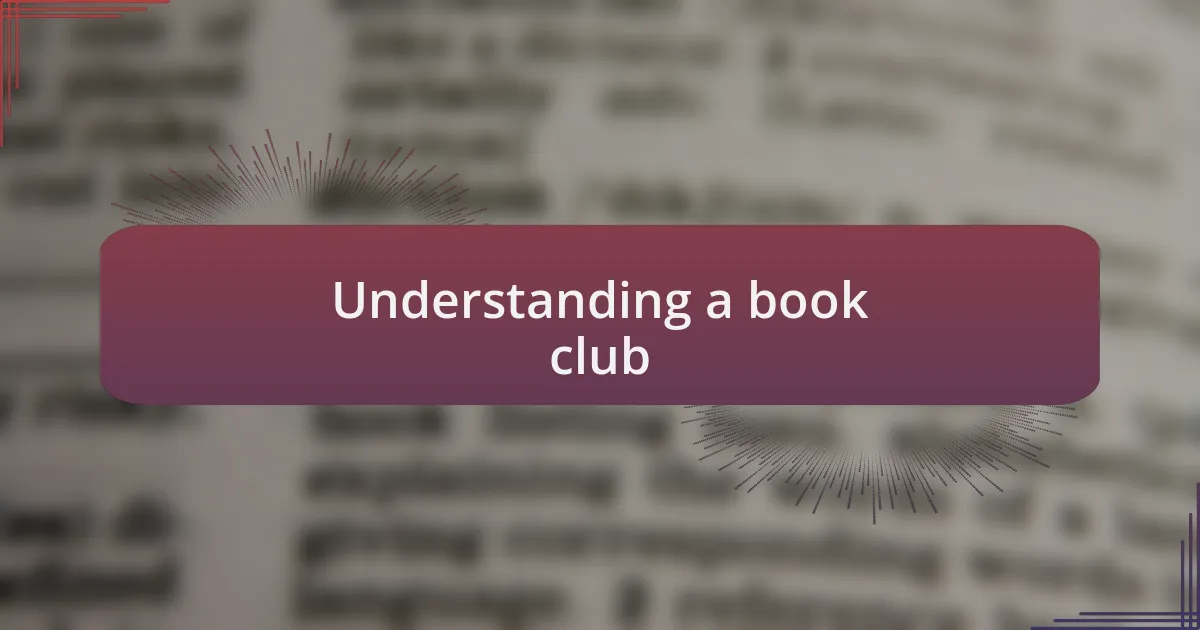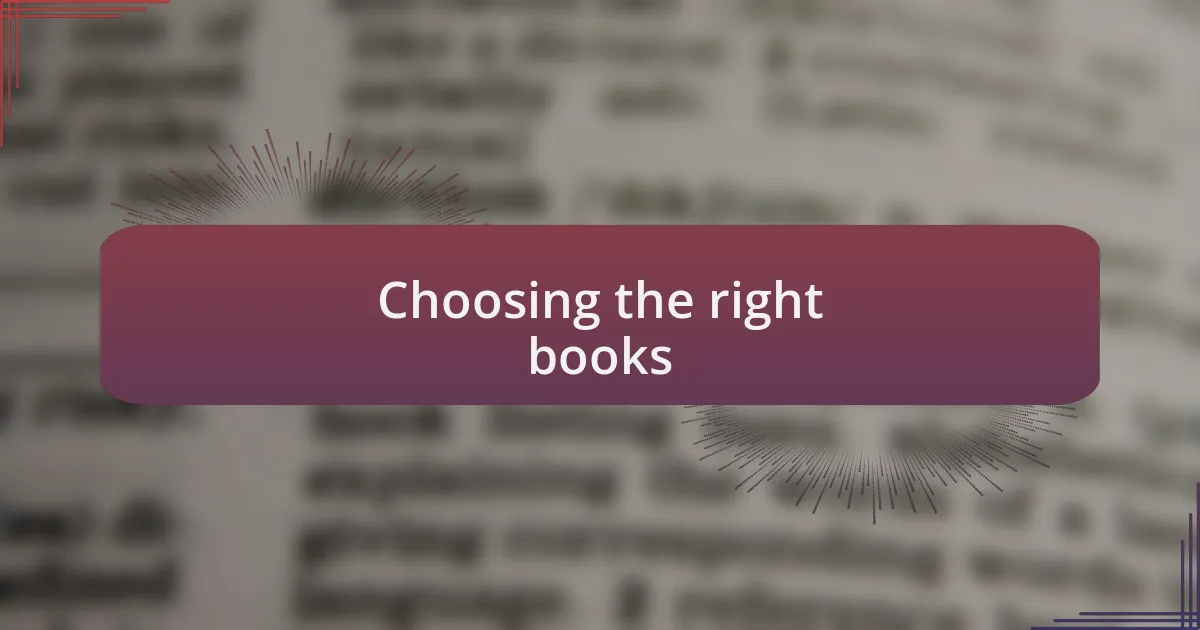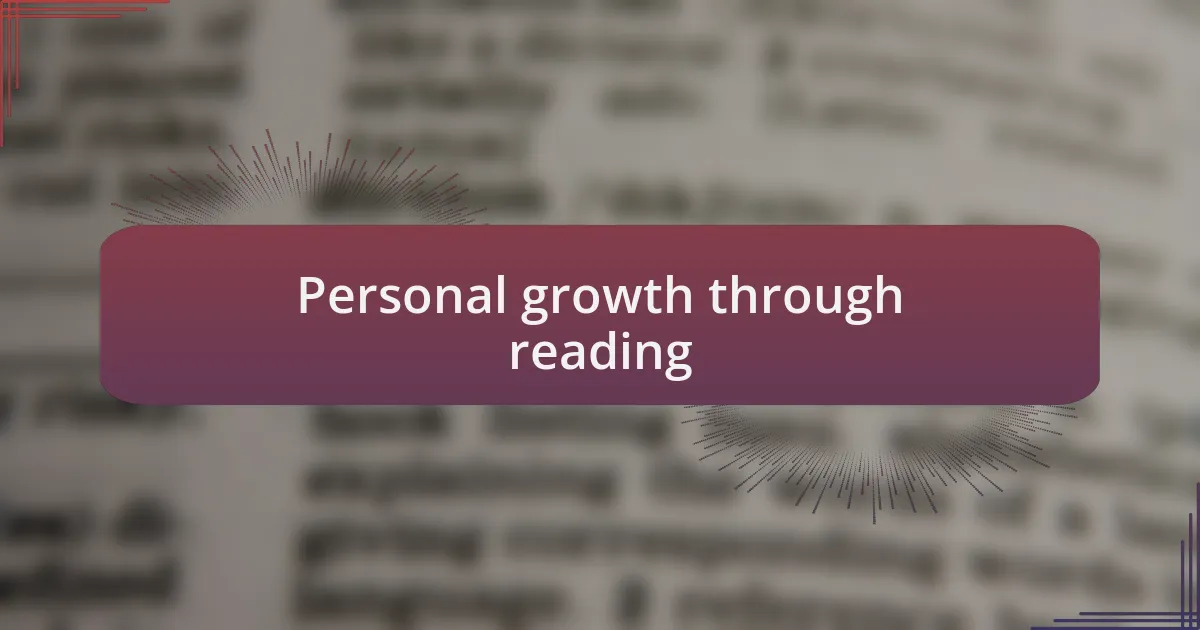Key takeaways:
- A book club fosters diverse perspectives and enriches discussions through shared experiences and emotional connections.
- Accountability in reading enhances engagement and deepens the overall reading experience, while also introducing members to new genres and authors.
- Choosing the right books and creating a comfortable environment can lead to meaningful dialogues and personal growth through literature.
- Personal connections and friendships developed in book clubs often enhance the reading experience and support emotional exploration.

Understanding a book club
A book club is more than just a group of people reading the same book; it’s a gathering of diverse minds sharing perspectives and emotions. I remember my first book club meeting, sitting in a cozy living room, surrounded by warm mugs of tea and lively discussions. There’s something magical about hearing different interpretations of a story you thought you knew so well.
In a book club, each participant brings their unique experiences to the table, enriching the conversation far beyond the pages of the book. Have you ever considered how a single sentence can evoke entirely different feelings in each person? That’s the beauty of it—a single character or theme can resonate on multiple levels, leading to a tapestry of insights that I often find enlightening.
It’s this shared journey of discovery that creates a bond among members, turning reading into a communal experience. I’ve found that discussing themes of friendship, betrayal, or love in a supportive environment can lead to profound self-reflection. Doesn’t that kind of connection make you appreciate literature even more?

Benefits of a book club
One of the standout benefits of being part of a book club is the accountability it fosters. When I know I have to discuss a book with others, it pushes me to read more thoughtfully. Have you ever finished a book and realized you couldn’t explain it as well as you’d hoped? This kind of accountability motivates me to engage with the material on a deeper level, enhancing my overall reading experience.
Moreover, book clubs introduce me to genres and authors I might not have explored on my own. I recall when a friend recommended a classic I had always overlooked. That discussion opened my eyes to an entirely new appreciation for literary styles I previously dismissed. Isn’t it fascinating how stepping outside our comfort zone can lead to unexpected joys?
Lastly, the social aspect of book clubs is invaluable. Building friendships over shared literary experiences enriches my life in so many ways. I remember a particular evening where the discussion veered from the book to our personal stories. It felt like a woven fabric of connection, showing how literature can bridge individual experiences across a room full of readers. Wouldn’t you agree that those moments make reading feel even more special?

Choosing the right books
Choosing the right books for a book club can truly shape the dynamics of your discussions. I’ve found that selecting a mix of popular titles and hidden gems fosters a lively exchange of ideas. For instance, I once suggested a lesser-known memoir that unexpectedly triggered a deep conversation about personal growth—proof that sometimes the underdog can spark the most profound dialogues.
It’s also essential to consider the diverse interests of the group. I remember a book club member who was hesitant about reading science fiction but ended up loving a title I recommended. When everyone’s tastes are taken into account, it opens the door to richer discussions and deeper connections. Isn’t it interesting how a single book can bring together a range of perspectives?
Lastly, I believe timing plays a crucial role in the selection process. Choosing a book that aligns with current events or themes can lead to more engaging conversations. I recall picking a novel that mirrored societal challenges, and I was amazed at how our discussions branched out into real-world implications. This connection between a book and our lives can turn the reading experience into something truly transformative.

Engaging discussions in book clubs
Engaging discussions in book clubs often stem from the diversity of opinions shared among members. I remember a session where we tackled a contentious novel—one that sparked fierce debate about morality and choices. It was fascinating to see how each person’s background and beliefs shaped their interpretation of the plot. That lively back-and-forth not only deepened our understanding of the narrative but also built a stronger bond within the group. Have you ever experienced a moment in a discussion where someone’s viewpoint challenged your own?
The atmosphere during our discussions can greatly influence engagement. There have been times when we incorporated snacks and drinks, which helped to create a relaxed and open environment. I recall a meeting where someone brought homemade cookies, and the warm, inviting smell seemed to melt away any shyness. As we settled in, the conversation flowed freely, and I found that the combination of a cozy setting and shared treats sparked creativity in our analysis. Wouldn’t you agree that comfort can lead to candor?
Moreover, asking open-ended questions can transform a good discussion into a great one. I’ve experimented with engaging prompts that have elicited surprising insights. For example, asking my group, “Which character do you empathize with the most and why?” led to a heartfelt exchange of personal stories. Each response revealed layers of our lives and beliefs, connecting the narrative with our experiences. These connections not only enhance our discussions but also enrich our understanding of ourselves and others in the club.

Personal growth through reading
Reading has always been a catalyst for my own personal growth. Each book I encounter offers a new perspective, nudging me to reflect on my own beliefs and values. For instance, after reading a memoir about overcoming adversity, I found myself reassessing the challenges in my life and realizing that they, too, could be opportunities for growth. Have you ever closed a book and thought, “That’s exactly how I feel”?
The transformative power of literature often lies in its ability to help us navigate emotions that might otherwise remain unexamined. There was a time when I stumbled upon a novel that explored themes of loss, and it resonated with my experiences in a way that left me both vulnerable and enlightened. I remember having a long conversation with a friend about our shared feelings of grief, which deepened our connection and encouraged us both to face our emotions rather than avoid them. Isn’t it amazing how a story can validate our experiences and foster tough conversations?
Moreover, reading can inspire us to step out of our comfort zones and embrace change. I vividly recall reading a book that challenged societal norms regarding career choices. It motivated me to consider new paths I had always deemed too risky. As I mulled over the author’s perspective, I found myself pondering, “What if I took that leap?” Books have this incredible ability to plant the seeds of courage in our minds, urging us to act on our dreams. How has a book inspired you to make a bold move in your own life?

My favorite book club experiences
One of my favorite book club experiences happened during a discussion on a dystopian novel. The tension in the room was palpable as we unpacked its themes and implications for our world today. I felt such a rush of excitement sharing my thoughts with others who were equally passionate, and it reminded me of the power of a good narrative to spark meaningful dialogue.
Another unforgettable moment was when we delved into a collection of short stories by a lesser-known author. As we shared our interpretations, the conversation took unexpected turns that illuminated the stories in ways I hadn’t considered. I remember someone saying, “This is why I love book clubs; we bring our own lives into the stories, and that’s what makes them truly come alive.” Isn’t it fascinating how each person’s unique perspective can enrich the reading experience?
What truly stands out to me are the friendships forged through our shared literary journeys. I recall one evening, huddled on my couch with a warm cup of tea, discussing our favorite characters and their choices. We laughed and cried together, creating a safe space for vulnerability amidst the backdrop of fiction. Have you ever felt a bond with someone because of a book you both loved? It’s one of those serendipitous connections that deepens over time, thanks to the pages we explore together.